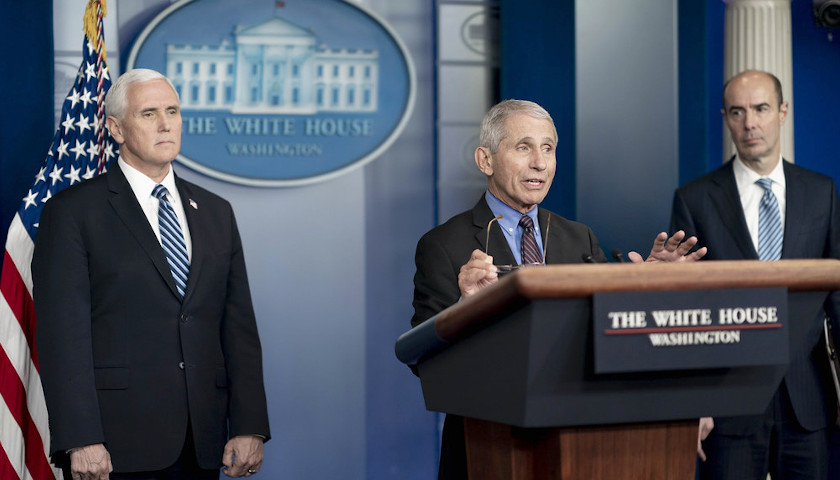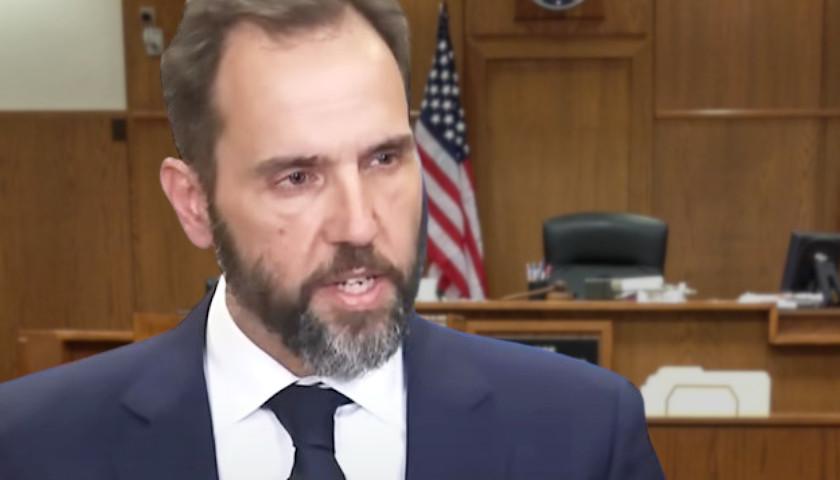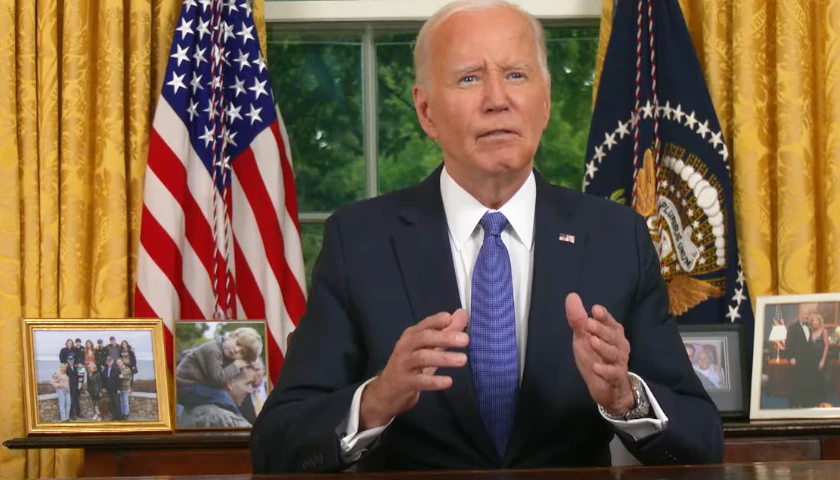by Debra Heine
In two interviews on Easter Sunday, White House coronavirus task force member Dr. Anthony Fauci seemed to fault President Trump for not adopting mitigation policies for the coronavirus earlier.
After Fauci told CNN host Jake Tapper that the country “could’ve saved lives” if it had started mitigation efforts earlier, Trump seemed to hit back by retweeting a post calling for him to be fired. The White House, however, claimed in a statement Monday that Trump has no intention of firing Fauci, and he remains “a trusted advisor” to the president.
During his appearance on CNN’s “State of the Union,” Fauci was asked about a recent New York Times report claiming he and other infectious disease experts had recommended social distancing guidelines to the president in the third week of February. The scathing report was based on “dozens of interviews with current and former officials and a review of emails and other records.”
“The administration didn’t announce such guidelines to the American public until March 16, almost a month later.” said Tapper. “Why?”
“You know, Jake, as I have said many times, we look at it from a pure health standpoint,” Fauci answered. “We make a recommendation. Often, the recommendation is taken. Sometimes it’s not. But we — it is what it is. We are where we are right now.”
Fauci clarified his remarks during Monday’s coronavirus task force press conference, telling reporters that the president immediately acted on the experts’ recommendations.
When Tapper asked whether lives could have been saved if the social distancing guidelines had been adopted in the third week of February instead of the middle of March, Fauci demurred, saying it was difficult to answer “what would have, would have” questions. But he acknowledged that “obviously, you could logically say that if you had a process that is ongoing and you started mitigation early, you could have saved lives. Obviously, no one is going to deny that, but what goes into those decisions is complicated.”
He added, “But obviously, you’re right. If we had—right from the very beginning—shut everything down, it may have been a little bit different, but there was a lot of push-back about shutting things down back then.”
Later Sunday, Fauci told MSNBC’s Al Sharpton that it first became clear to him in “the middle to end of January” that COVID-19 could become a major problem in the U.S.
“As soon as it became clear that there was community spread, which means that it isn’t just a travel-related case, that there are cases that are in the community under the radar screen, then it became clear that we were in real trouble,” he said.
While Fauci on MSNBC claimed that it was clear to him as early as mid-January that COVID-19 was a serious threat and “we were in real trouble,” he publicly downplayed the virus’ potential impact in the U.S. repeatedly throughout January and February.
On Jan. 21, for instance, he emphasized that it was unclear whether the virus could spread from person to person: “Is it a continual spread? Is it sustained? We’re not quite sure yet.”
Two days later, the infectious disease expert said in an interview that there was “no chance in the world” America would see city-wide shut downs.
In a Jan. 23 Journal of the American Medical Association podcast, Fauci pointed out that all five cases in the U.S. at the time were travelers from China and noted that the number of infections was likely much higher than official counts because of limited testing in China, so the death rate of the virus was likely much lower than feared.
Asked whether the U.S. might contemplate city-wide shutdowns like those China was enacting at the time, Fauci replied, “There’s no chance in the world that we could do that to Chicago or to New York or to San Francisco, but they’re doing it. So, let’s see what happens.”
Most importantly, he added that it was still quite possible the Chinese could get control of the outbreak and prevent it from becoming a global issue, and that even if there were more cases in the U.S., “the CDC, as usual, is on top of things.”
Fauci was still downplaying the threat of the virus in the U.S. as late as Feb. 18, calling it a “hypothetical danger” that was “just minuscule” compared to the “real and present danger” of the seasonal flu.
During an interview on NBC’s Today morning show on February 29, Fauci expressed concern about the dangers of community spread within the U.S, but stressed that there was no need for anyone to change their lifestyles yet.
After the CNN interview, President Trump seemed to fire back at Fauci, retweeting a former Republican congressional candidate’s post calling for the infectious disease specialist to be fired.
“Sorry Fake News, it’s all on tape,” he tweeted. “I banned China long before people woke up.”
Sorry Fake News, it’s all on tape. I banned China long before people spoke up. Thank you @OANN https://t.co/d40JQkUZg5
— Donald J. Trump (@realDonaldTrump) April 12, 2020
The White House pushed back on the Times’ report later on Sunday.
White House spokesman Judd Deere said that in January and February, Trump “took bold action to protect Americans and unleash the full power of the federal government to curb the spread of the virus, expand testing capacities, and expedite vaccine development when we had no true idea the level of transmission or asymptomatic spread.”
“The President remains completely focused on the health and safety of the American people and it is because of his bold leadership that we will emerge from this challenge healthy, stronger, and with a prosperous and growing economy,” Deere said.
During the White House task force press conference late Monday afternoon, Fauci clarified that President Trump agreed to increased mitigations to prevent the spread of COVID-19 the very first time he and fellow task force member Dr. Deborah Birx recommended them.
CBS reporter Paula Reid actually asked Fauci if he had made the remarks voluntarily.
“Everything I do is voluntarily,” he replied. “Please, don’t even imply that.”
The word of the day is “pushback”. https://t.co/TQnKntmC5a
— Martin Heberling III (@HeberlingOH) April 14, 2020
Some on the right have become suspicious of Fauci’s intentions, especially after an email surfaced that he sent to Hillary Clinton aid Cheryl Mills on January 23, 2013, revealing the doctor’s admiration for the then-Sec. of State.
“Anyone who had any doubts about the Secretary’s stamina and capability following her illness had those doubts
washed away by today’s performance before the Senate and the House,” Fauci wrote. “She faced extremely difficult circumstances at
the Hearings and still she hit it right out of the park. Please tell her that we all love her and are very proud to know her.”
The hearings to which Fauci referred were held to examine the Obama administration’s inadequate response before, during and after the Sept. 11, 2012 Benghazi debacle.
In multiple media appearances, Obama officials promoted a false narrative surrounding the attack on United States government facilities in Benghazi, Libya, claiming the violence stemmed from a spontaneous outburst of mob anger over an anti-Muslim YouTube video. It would eventually become clear that it was a premeditated terrorist attack on the facilities. Four Americans were killed during the sustained attack; Christopher Stevens, Sean Smith, Tyrone S. Woods and Glen Doherty.
Clinton did perform well during the Benghazi hearings months later, infamously exclaiming, “what difference does it make!” when asked by Wisconsin Senator Ron Johnson about the motive for the attack. “Was it because of a protest or was it because of guys out for a walk one night and decided they’d go kill some Americans? What difference—at this point, what difference does it make?!”
Although the nation would not learn the truth about the attack until well after the 2012 elections, Clinton and other Obama officials knew it from the beginning. In an email on the night of the attack, Clinton confided to her daughter, Chelsea, that an al-Qaida faction was actually responsible for the bloodshed. By January of 2013, it was clear that the the Obama White House had chosen to deceive the nation rather than risk the public relations nightmare of admitting terrorists had again struck Americans on 9/11, less than two months before Obama’s re-election day.
In retrospect, it’s hard to see how anyone other than a partisan Clinton stooge would be impressed by her appallingly mendacious performance at those hearings.
The Benghazi hearing email wasn’t the first time Fauci had expressed his admiration for Clinton in writing.
In a June 2012 email to Mills, Fauci gushed about a speech Clinton had delivered in Oslo Norway regarding women’s health.
“Wow! Very rarely does a speech bring me to tears, but this one did it. Talk about telling it like it is. This was a bases-
loaded home run. Please tell the Secretary that I love her more than ever you guys too, of course,” Fauci wrote.
Legendary talk radio host Rush Limbaugh last week accused Fauci of being a “Hillary Clinton sympathizer” who is trying to undermine the president.
“Jonathan Karl yesterday brought in a China-sympathetic reporter to that press briefing. That China reporter in there from Phoenix TV — that’s a Chinese dominated company — Jonathan Karl of ABC runs the White House Correspondents’ Association, so he brought the reporter in there,” Limbaugh said on his program Tuesday. “And I don’t know if anybody noticed it, but little Dr. Fauci at the end of the briefing gave Karl a thumbs-up like a ‘job well done’ kind of thing.”
“We got all of these Hillary Clinton sympathizers still on the medical expert team here. And we know that one thing has not changed, and that is these people’s desire above everything else to get rid of Donald Trump,” Limbaugh continued.
Investigative reporter Paul Sperry has also expressed doubts about Fauci’s objectivity.
BREAKING: A month before 2016 election, NIH's Dr. Anthony Fauci & his Hillary-donating Democrat wife Christine Grady attended a DC party co-hosted by Hunter Biden's ex-wife + other anti-Trump Dem activists, inclg Obama aides Valerie Jarrett & Jeh Johnsonhttps://t.co/nG2pAFzqbu
— Paul Sperry (@paulsperry_) April 8, 2020
In a show of support for Fauci, White House deputy press secretary Hogan Gidley on Monday denied that Trump has plans to oust the official.
“This media chatter is ridiculous – President Trump is not firing Dr. Fauci. The President’s tweet clearly exposed media attempts to maliciously push a falsehood about his China decision in an attempt to rewrite history,” Gidley stated.
“It was Democrats and the media who ignored Coronavirus choosing to focus on impeachment instead, and when they finally did comment on the virus it was to attack President Trump for taking the bold decisive action to save American lives by cutting off travel from China and from Europe. Dr. Fauci has been and remains a trusted advisor to President Trump.”
The president announced on Friday that he is assembling a new council of business and medical leaders intended to guide his administration toward reopening the U.S. economy.
Trump said the members of the “opening up the country council” would be announced on Tuesday.
The White House is hoping to reopen parts of the country by May 1.
– – –
Debra Heine is a regular contributor to American Greatness.







Dr. Fauci is the face of everything that has been done wrong with respect to COVID-19. It appears that President Trump has been played by Fauci and Brix.